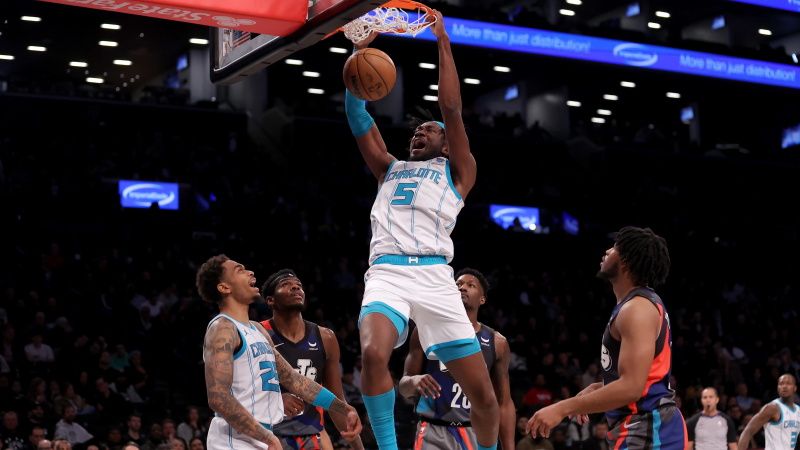Dez Bryant came for ESPN’s Malika Andrews over Josh Giddey coverage. He missed the mark.
You may have missed what’s become one of the most talked about stories of the week. It’s about former Dallas Cowboys star receiver Dez Bryant criticizing ESPN’s Malika Andrews for what Bryant says is Andrews having one standard for criticizing Black NBA players vs. white ones.
In some ways, this story is gossipy and silly. It’s also an example of how in today’s media environment someone can be attacked (in this case Andrews) with no factual basis for doing so.
In other ways, however, this story is important and nuanced. It embodies how some women in sports overall and also in sports journalism, particularly Black women, are treated harshly by fans and others. How they are held to impossible and unfair standards. In some cases, how Black journalists are expected to instantly and unapologetically cape for the Black athletes we cover.
Yet this story is also about how Bryant is correct (and this is the nuanced part) that Black athletes are held to a different standard than their white counterparts. Bryant now views himself as almost a sports racial ombudsman and his voice took this discussion (eventually) to a higher plane despite it originating in a much lower one.
In the end, Bryant’s confronting Andrews was misplaced, but his overall message, about the double standards, is an important one. Bryant in fact says he has seen these double standards himself.
NFL STATS CENTRAL: The latest NFL scores, schedules, odds, stats and more.
"I do wanna apologize for coming so aggressive at @malika_andrews," Bryant wrote, in part, on X. "But I do wonder if she even realizes how certain things look? Sports & media is a big deal to the culture. I’ve battled my entire sports career pleading to the world.
"We are more than the game we play. We just need better help. Millions of dollars to do a job is not worth more than a humans mental (health) especially if you got a family who loves you.
"I’ve experienced unfairness and saw white athletes get a slap on the wrist for doing sh—I know that will get you kicked off a team in a heartbeat. I really hate to make it seem like a black and white thing but the unfairness is real."
Let’s quickly back up for a minute.
For months now, if not longer, Andrews has caught the ire of NBA fans for the errant perception that she is more critical of Black coaches and players than white ones. It has to be made clear: there is no proof she does this. It’s a lie.
Much of the criticism of Andrews, to me, is about the fact she’s a woman. There are men who don’t like it when women are as aggressive in their coverage and opinions as men.
As evidence of Andrews’ bias, Bryant, and others, point to her questioning in the of Alabama’s Brandon Miller in the June draft. His name emerging in a murder investigation was one of the biggest stories of Alabama’s March Madness run. Miller was cleared and not charged with a crime but the story dominated the news for weeks.
Not only was Andrews correct in mentioning the story, it would have been journalistic malpractice not to do so. Yet she was relentlessly attacked online for doing her job.
Something similar happened after the Celtics suspended former coach Ime Udoka. Andrews phoned into Stephen A. Smith’s show in September of last year and the two got into a heated discussion.
"Stephen A., with all due respect, this is not about pointing the finger. Stop," Andrews said. "The fact that we are sitting here debating whether somebody else should have been suspended or not, we ARE NOT here, Stephen A., to further blame women."
That led to more bashing of Andrews over social media.
When news of the allegation involving Oklahoma City star Josh Giddey and an underage girl recently surfaced, Andrews was accused of not addressing Giddey’s alleged issue with the same fervor as she did with Miller and others. The basic accusation being that the other players are Black and Giddey is white.
"You went out your way to crucify Brandon Miller on draft day over something he didn’t even do," Bryant said on X. "Why haven’t you said nothing about Josh Giddey?
"I advise you not to make this a black or white thing. Your parents really raised you wrong and just because you went to a private school don’t make you better. You appeal and I know your kind. You just a puppet. I don’t know how a former or current nba player could sit there across from you and look at you with some kind of respect."
One of the biggest problems with Bryant’s argument, and everyone else’s, is that there’s really nothing to go after Giddey about. Law enforcement and the NBA are investigating the matter. But there’s nothing else, at least for now, to say.
Bryant was wrong to go after Andrews but his larger point about double standards shouldn't be lost. It's true. This is the case with many Black Americans in all walks of life.
Hopefully that's the biggest point that sticks from this entire mess.

Disclaimer: The copyright of this article belongs to the original author. Reposting this article is solely for the purpose of information dissemination and does not constitute any investment advice. If there is any infringement, please contact us immediately. We will make corrections or deletions as necessary. Thank you.







